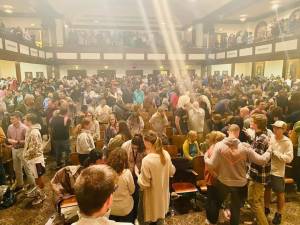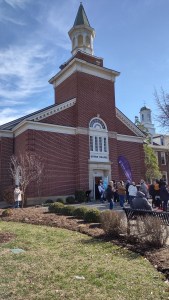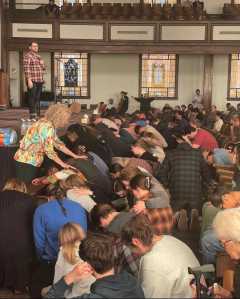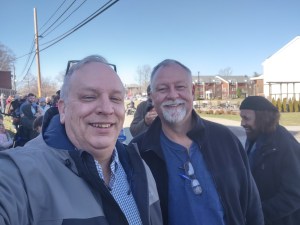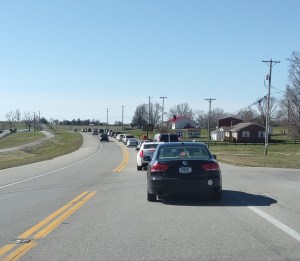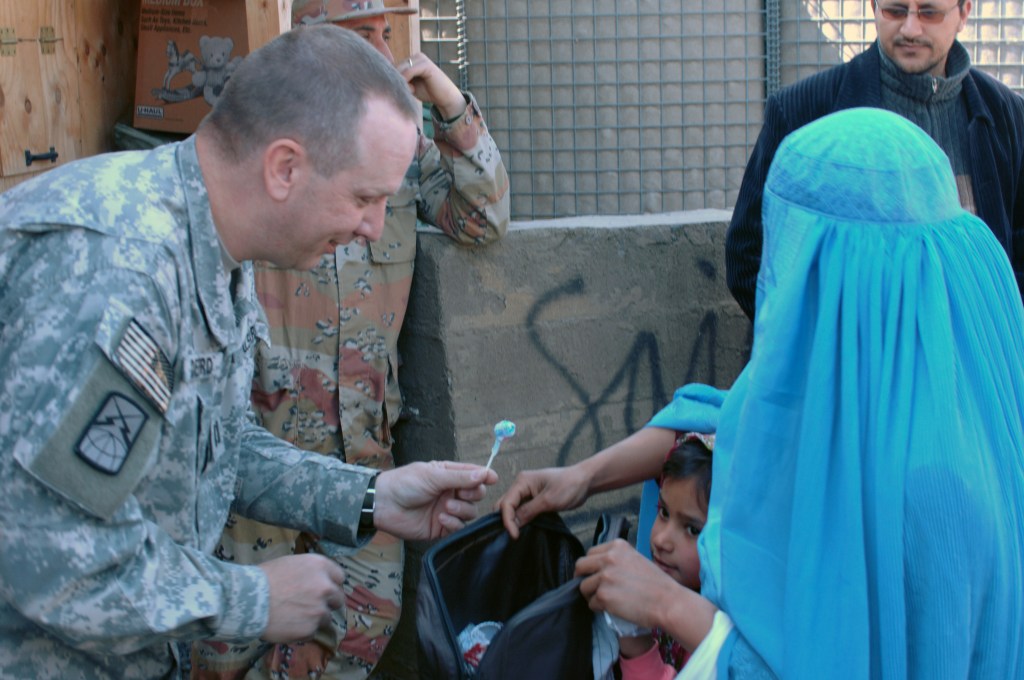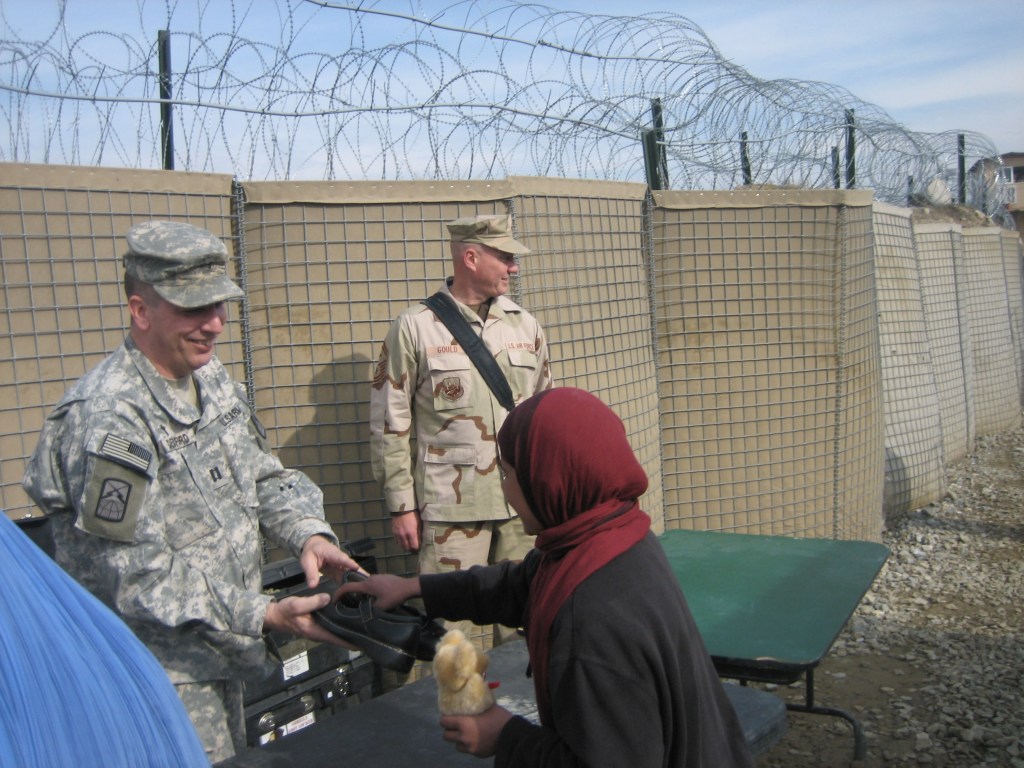SATURDAY WAS GOOD, BUT NOT WHAT WE NEEDED
On Saturday, February 18th my wife, Holly, my youngest daughter, Heidi, and I made the three-and-a-half-hour drive from Logan, West Virginia to Wilmore, Kentucky, home of Asbury University. This wasn’t the normal “college visit.” It wasn’t a vacation. It was more like a pilgrimage to experience God in a greater way.
If you somehow haven’t heard, something special happened following the regularly scheduled chapel service at Asbury University on February 8th. Students remained after chapel, then returned after classes, then stayed all night, for prayer…for worship…for confession and repentance…for God. There was a miraculous outpouring of the Holy Spirit with countless testimonies of lives changed-spiritually and physically. This had been going continuously for ten days when we arrived on the 18th.
This outpouring was so significant that students from other schools around the country visited Asbury and returned to their schools where many experienced similar visitations of the Holy Spirit. Interesting to note, these schools were from different theological traditions: Methodist, Pentecostal, Baptist, Nazarene, and others. In addition to the schools, individuals from literally around the world visited Asbury, wanting to experience God in the way they saw in the videos and testimonies that had gone viral since the “outpouring” began.
That is why I wanted to go to Asbury. I wanted to experience God in the same way I had heard in the testimonies and saw in the videos. And I wanted my daughter to experience what revival scholars have called a “once in a generation” event. We went not as “spiritual tourists” but really wanting to be participants in a movement of God.
We arrived at the campus about 12:30, only a half an hour before the doors to Hughes Chapel were to open. We noticed the line of people going around the block already so quickly found a place to park and started the 2 mile or so walk from our parking spot to the end of the line.
I had read on the University’s website that there was a separate line for students-high school and college, so asked if Heidi wanted to get in that line so that even if we didn’t make it into the chapel, at least she would, and could experience it. So while Holly waited in line, I took Heidi around to the front of the chapel and found the student line, still a long line, but not nearly as long as the “public” line. It took Heidi about an hour or so to finally get into Hughes Chapel.
In the meantime, I noticed Estes Chapel across the street, which was one of the overflow sites where they provided a live-stream from Hughes Chapel. I contemplated the chances of us making it into Hughes like we wanted, as long of a line there was, so texted Holly about me getting in the line for Estes, which she encouraged me to do. While I waited, we texted about whether her line would allow her (with me joining her later) to get into Hughes, or not, and whether it would be better for her to come and join me to go to Estes. She decided she’d wait in the main line while I went to Estes, then I would find her in line later.
I was in the line for about an hour and a half waiting to get in to Estes Chapel. Being right across the street from Hughes Chapel, we were close enough to see the large screens they set up in the lawn in front and we could hear the sounds through the speakers, coming from Hughes. As testimonies were shared, Scriptures read, prayers said, and songs sung, I found myself (along with others in the line for Estes Chapel) joining in the praying and singing, often with tears coming to my eyes as I felt God’s presence make his way through the line. I probably felt him most though, as I prayed for Heidi, now in Hughes Chapel, that God would speak to her, make himself known to her, and get ahold of her. I prayed that she would experience God and this gathering of young people on fire for God, in a way that would change her life.

Finally, I was close enough to the door of Estes Chapel that when they called for “one person” I could step up! They had a good system of “ushers” (who were faculty and staff of the University and Seminary serving way below their pay grade, which just showed their servant-hearts). The ushers would watch for people to leave then signal to the ushers at the door how many seats were available, then another would lead the incoming worshippers to the empty seats.
I was led to a seat about half way up on the right side. Room enough for three, I was seated beside two guys from Indiana who had been there an hour or so. After taking a quick trip to the restroom (since I had been waiting in line for a while!) I settled into my seat to see what God would do.
I wondered what it would be like in the overflow chapel instead of the main chapel. While it obviously wasn’t the same, it wasn’t as bad as I thought it would be. There were two screens mounted in the front of the sanctuary and the sound from the stream was good. The leaders at Hughes, knowing they were being streamed to other sites, would often mention “those in Estes and McKenna Chapels” which helped us to feel more like a part of the main group. Nearly everyone where I was seemed to be not just a spectator but a participant. There were shouts of praise and thanks when what was said at Hughes, through the live stream, made it appropriate. When songs were being sung at Hughes, they were sung equally as strong in Estes. When we were called to pray, prayers were lifted as fervently as in the main chapel. When God moved, people in Estes responded and the altars were used, with volunteers praying for those seeking help. I really enjoyed my time there (as I usually do participating in times of worship). I genuinely felt God’s presence and felt very blessed to be there. I was glad that I could participate and experience what I believed would be an historical event in the Church, while I continued to hope and pray that Heidi would experience God in a way I had been hearing about and seeing happening to so many during this outpouring at Asbury.
I spent about an hour or so in Estes, then felt like I needed to get back to Holly who had been in the line for Hughes Chapel for over four hours. It took a bit to find her (it was a long line) though I finally did just in time to get a Chick-fil-a sandwich from the Salvation Army truck parked by the line! By then Heidi was also with her, having just stayed in Hughes Chapel a short time. Holly and I were disappointed. We had such high hopes that this exposure to what was happening would draw all of us in like I had been seeing in the videos and testimonies from Asbury. But it was what it was.
Holly decided to go over to Estes Chapel while I took her place in the line for Hughes. Going to Estes, at least she would experience more than just waiting in line and after a bit she could rejoin me in line and maybe we would get into Hughes. Holly texted a little while later that her time in Estes would satisfy her so I shouldn’t continue to wait in the Hughes line if I didn’t want to. I told Holly to stay at Estes as long as she wanted (or needed) to and let me know when she was ready, that we would be fine. She stayed at Estes Chapel for about an hour and just when I was about to suggest that Heidi and I run to a store or two then come back and pick her up, she said she was ready to go so I drove over and picked her up. As we made our way toward home, to a hotel about 45 minutes from Wilmore, we talked about our experience at Asbury. I said that I enjoyed it and was blessed, but it wasn’t like the experience I was hoping for after hearing the testimonies of others who had been there…and in Hughes Chapel earlier in the week. Holly agreed that she enjoyed the time in Estes Chapel and we were all ready to go home. Glad we had come, blessed by experiencing a movement of God, but still a bit disappointed.
GOD WAS EVEN MOVING IN THE LINES
There’s more to our time at Asbury, some very exciting things that happened later, but let me jump in here for a few minutes and talk a little about the “Outpouring” and how the University handled it, then I want to tell you some of the amazing things that we experienced while waiting in line-a time you would expect to be mundane, before I get to what God finally did for us.
I’m not going to provide a commentary on what I think what some are calling a “revival” is or isn’t or what I think should be the follow-on fruit of this event. What I do want to share is my involvement in it, what I observed, what I felt, and what I experienced.
From what I have read and seen, there were groups of students praying for revival weeks or even months prior to February 8th. It seems that God chose to answer their prayer in a very dynamic way. So, God came to the Asbury campus which just spurred more prayer which brought more God which brought repentance, healing, reconciliation, cleansing, filling, and all sorts of other spiritual and physical actions.
It was interesting to watch those who served the worshippers, including thousands of visitors-it was the staff and faculty of the University and Seminary. It wasn’t unusual to see a PhD seating guests or another professor guiding traffic. There were also many other people who volunteered to help facilitate this moving of the spirit without much rest or reward. The Salvation Army was there in force distributing water, coffee and food to those in line. The little Wilmore Christian Church across the street from the University provided hot dogs, chips, cookies and water for the people in line. Others walked along the throngs of people with granola bars, fruit snacks, water, all types of refreshments, asking for nothing in return.
I wondered how the community thought about this influx of thousands of people into their small community but have heard reports that the businesses are enjoying the boost in sales, with visitors needing to eat, gas up, and lodge. A lady in the house next to where we parked on Saturday opened her window and yelled out to us to have a great time of worship! On Sunday, the traffic did begin to be too much for the town to handle, while Hughes chapel and the overflow locations were filled to capacity, requiring local authorities (who the University administration had been in close communication with) to close the town to people coming to the campus to take part in the “Outpouring.” We were fortunate that we had arrived earlier in the day, with the traffic only being diverted to the far side of town and funneling into a parking area near campus. As we left town, the line in continued to be long, and probably few of those made it inside.
As for the “services” themselves, though that word “services” is more formal than what was happening, at least at the beginning, what was striking was the simplicity. There wasn’t a stage full of instruments. There wasn’t special lighting or effects. There weren’t professional singers, musicians or worship leaders. In fact, some reports have said that some high-profile musicians and ministers had volunteered to lend their services to the University but were kindly refused. What was there for instrumentation was simply a piano and sometimes a guitar. The singers were students who, while some were significantly polished, others were less so, but all of them appeared to have a heart for God and a desire to see Him move and work in their presence.
There wasn’t any formal preaching or teaching (except during the already scheduled chapel times) but there was music being played and sung, prayers being offered, testimonies being shared, scriptures being read, and even spiritual artwork being created. At least in the beginning, there didn’t seem to be any plan or order of worship, but rather progressed as the Holy Spirit moved and prompted people to act.
During everything that was going on you could see individuals, pairs and groups praying for themselves, for others, and for God’s presence. Seldom did you seen anyone at the altar praying by themselves, as someone would quickly rush to their side to pray with them. As the “Outpouring” continued, it seems there were prayer teams created or appointed to not only pray for seekers but to pray over those who would be playing, singing, reading or speaking before they took the stage, ensuring God was in every aspect and movement of the worship.
Early on, you saw very little participation from the staff or faculty, as they allowed it to be a student-led (or received) movement of God, a grass-roots movement if you will. Later, however, there were staff members who helped guide the times of prayer, scripture readings and testimonies apparently to help maintain the integrity of the presentations and to provide everyone who God moved on an opportunity to share.
There were many acts going on during this “outpouring”: repentance, confession, reconciliation, healing, encouraging, and I’m sure countless more as God moved through the crowd, but I noticed three main elements which seemed to stand out above the others during the time I was there: Prayer, testimony and praise.
As I mentioned earlier, there was almost constant prayer going on in small groups or with everyone, as individual needs were identified or God led the larger group to pray. Often, after testimonies, individuals would be prayed for and at times, entire groups who may share the struggles related in the testimonies, were lifted up in prayer. Prayer served as a major component to not only bring on this outpouring but to make it a time of repentance, healing and deliverance for hundreds of people; as well as for petitioning God to continue pouring out his spirit and working among them.
Testimonies naturally flowed from the times of prayer as God answered those prayers and brought a change in people’s hearts, emotions, mentalities, attitudes or bodies. Once delivered, people couldn’t help but testify to what God had done for them which spurred on more prayer, more testimonies and more praise.
Praise is the third element that I saw emphasized. How could one not praise God after being touched by Him and experiencing His presence? How could people not lift their voices in praise and worship after hearing testimony after testimony of God’s power working in people? How could a symphony of praise not be raised as so many bask in the loving presence of God? Scripture says that God inhabits the praise of his people so with God so very present, praise to Him is a natural response, while lifting our praises draws God closer and more intimately involved.
These three: prayer, testimony and praise seemed to feed off each other and result in them all continuing as God worked miracles in the lives of the worshipers. These are what I noticed as prominent during the time I was there, though undoubtedly, other elements or acts may have been more prominent at other times. Additionally, while I saw prayer, testimony and praise seemingly causing the continuation of the Asbury Outpouring, I don’t suggest that emphasizing those three in another setting would bring the same results. God will move when and where he determines, but there is another essential element.
As my pastor and I were talking about what was happening at Asbury, he pointed out that God may be willing to move in our presence and pour out his spirit, giving us revival, but unless we are open to Him and ready and willing to receive Him in a greater measure -with all that comes with it- God will pass us over and move to another group who is ready and willing to receive what He has for them.
For those at Asbury, they were prepared through prayer, desperate enough to seek God’s face, and willing to allow God to do His work in their lives, so God came in a miraculous way…so much so that we are still talking about it today.
Since so many people were coming to Wilmore, Kentucky hoping to experience what they had been hearing about God doing, Hughes Chapel, though very large, could not accommodate everyone. Even after opening the chapels across the street at the Seminary for overflow and streaming from Hughes, then later other venues, the lines of people waiting to get in were as long as two miles, with people waiting several hours in the slow-moving line, hoping to get in. But unlike what you would see at an amusement park, secular concert, or in just about any other line you may find yourself, there was no complaining, no arguing, no unruliness, and very few pieces of trash left behind. Instead, you found people joyful and smiling, talking to those in line with them, learning about each other and making new friends. Prayer was common as people shared why they came to Asbury and the hurts or burdens they carried. Sometimes, there would be a sojourner with their guitar, pulling it out to lead an impromptu time of praise. You would often see groups huddled around a Bible, learning a new truth or being encouraged by God’s Word.
While Holly waited nearly five hours in line on Saturday, she prayed for people and other people prayed for her. She enjoyed the company of others seeking the same experience of God’s refining presence. She commented that because of the time spent with those around her in line, it didn’t seem like as long as it was that she waited to get close to Hughes Chapel.
While I was waiting in the line for Hughes on Sunday, I connected with the group of people around me and learned one was from a town in Ohio where we had considered retiring to. I mentioned that there was a Church of the Nazarene in that town, and she said, “I know, my mother attends there!” It seemed like God was at work.
I got to know Jeff a little bit. He was from Kissimmee, Florida and had traveled to his son’s home in Cleveland Tennessee the night before. He mentioned his son, A.J. who was not a Christian, then Alan suggested we pray for him, so we gathered around Jeff and prayed for him and his son A.J. God was at work in that line.
I discovered that Alan had been a Religious Program Specialist (which is like a Chaplain Assistant in the Army) in the Navy for eight years, giving us that in common since I was a chaplain assistant in the ‘80s and then later served as a chaplain. We continued to talk about all sorts of things as the line worked its way through campus to the chapel. It felt like God was blessing us even before we got to the there.
Holly and I talked to another lady who had driven there from Florida. We mentioned we were from West Virginia and she told us about a little town in West Virginia where back about 2017 the high school students started praying for the school and the community, and it was doing something. She told us she told her husband she had to go and pray with them so traveled to that small town in West Virginia. I asked her what town it was and she couldn’t remember the name. She thought for a bit and said, it started with an “L.” I said, was it “Logan”? She exclaimed, “Yes, that’s it!” then we told her we were from Logan. God seemed to being showing us that He brings us together from all over, and shows us ways we are connected through Him.
Finally, there was a group of three or four ladies that wandered up to two women who were in line in front of us and greeted them, obviously being friends. They asked if we mind if they jumped in with them and immediately Alan said it was fine. I looked at him and jokingly said that he didn’t give me time to tell them how much it would cost them. To this, one of the ladies said, we don’t have much to offer but we could pray for you! as we laughed a bit at the exchange. But then I said, “well if you really want to pray, you could pray for my daughter.” She then got very serious and asked how she could pray. I told her that I brought her to Asbury so that she could experience God in a greater way; so she could see young people on fire for God. I said that she was with my wife now in Estes Chapel and I hoped that God would touch them. This prayer warrior asked a few more questions about them then she, and the ladies with her, and Alan, began to pray for my wife and daughter, and they prayed hard, asking God to do things for them, seemingly knowing more of their needs than I had shared. God was proving himself to be faithful to put people in our lives -even while waiting in line to worship- who we needed to encounter, even if just for encouragement or prayer.
SUNDAY WE RECEIVED WHAT WE CAME FOR!
Now back to where I left off earlier. After leaving Asbury blessed but somewhat discouraged, we spent the night at a hotel about 45 minutes from Wilmore, ready to finish the remaining nearly 3 hours home Sunday morning, or maybe after church if we could find a local Church of the Nazarene. When Holly and I got up, Holly said that she felt like we needed to go back to the Asbury Outpouring, that we weren’t finished, or rather that God wasn’t finished. How could I disagree? So we ate a little breakfast and headed back to Wilmore. We were ahead of where we were on Saturday so were hoping we would be farther up in the line and maybe get into Hughes Chapel this time, but then we thought with it being the weekend, more people may be coming and probably getting there early, so it may be more difficult than the day before. Either way, we decided we would just do what we could and experience what we could, hoping that God would meet us there in a more pronounced way.
As we got a couple miles from Wilmore the traffic suddenly slowed to a craw and I feared the worse, that the multitudes were flooding in and the traffic was backed up that far. Fortunately, it was just a brief stop as a State Trooper asked if were going to the revival then directed us a different direction instead of through town, which led us onto campus and to a parking lot which was actually better than where we parked the day before. As we walked toward the chapel and saw that the line to Hughes wasn’t to where it was the day before. We decided to walk around to the front of the chapel first to check things out. When we got there, we noticed the line to Estes Chapel was very short, much shorter than it was Saturday when it took me about an hour and a half to get in. We decided that Holly and Heidi would get in the line for Estes Chapel and I would go get in the line for Hughes then we could communicate and see what we would do. As it approached 1:00, when they opened the doors and began the music, we decided I would stay in the Hughes line and see how quickly it moved. If I got close, I would text Holly and they would come and join me…while Holly and Heidi went into Estes, getting in right away when they opened the doors. As they approached the front of the sanctuary, Holly noticed a beam of light shining down on a particular pew and it looked like God showing them to their seat!
I continued in the line and had the interactions with the other people around me which I mentioned before, with Jeff, Alan, and the others. About 10 to 15 minutes after the women joined the two other women in front of us and prayed for Holly and Heidi, Holly texted and said they were looking for me. I told them where I was and they were soon walking up to me all smiles. As they got closer, I could see they had been crying. The first thing Holly said to me was “We got what we came for!” They had experienced God’s presence in that wonderful way that we were craving! While sitting in Estes Chapel, Holly suggested to Heidi that they go to the altar to pray for one of Heidi’s friends she was concerned about and about our unsaved family members. Once at the altar, God really came! A man prayed with Heidi and was divinely intuitive, leading her into a wonderful experience with God. Holly described her own experience as being a time of refreshing, refilling and renewal, just what she needed and was longing for. I hugged them both, excited that they received what we came for and was so glad that we went back to Asbury instead of settling for what we got on Saturday and going home.
Now, listen to this: Remembering that the ladies who cut in front of us in the line had prayed really hard for Heidi and Holly, I asked Holly about how long ago God came to them, and she said about 10 or 15 minutes. Tears began to come to my eyes as I realized that was the same time our serendipitous meeting with the women in front of us led to our praying fervently for Holly and Heidi. I introduced Heidi to the lady who led the prayer for her and Holly told her just as she was praying for them, God answered her prayers and touched them. Tears then began to stream down her face as well, as she saw the part she played, listening to God and being obedient. The three ladies then prayed for Heidi more, and for Holly and me as her parents, they gave Heidi an enormous amount of wise and godly counsel and encouragement and even shared what they saw as possibly her future in God’s hands…as all of us cried and praised God for his faithfulness to honor our desperation and meet our needs.
MONDAY WAS ANOTHER DAY OF BLESSINGS

We were all excited at what God had done for us. Heidi wanted to stay, or come back and told her older sister, Julia, that she had to go back to Asbury University with her to experience what she had. So, my two youngest daughters, Julia and Heidi, headed out on Monday morning with their camping gear to experience God at the Asbury Outpouring. They got into the area in time to set up their tent before going to the campus. They got to Asbury a couple hours before the 7:30 start time and finally got in and really enjoyed it. They became concerned about staying there while others were outside waiting to get in, but Holly had talked about “being selfish for God” and they wanted to experience more of Him so they stayed a bit longer. Their time there was likely more significant than Holly’s and Heidi’s the day before at Estes Chapel, I think because it was mainly students there at this service. God moved through the singing, the praying and the testimonies and my girls were touched again!
They called us later that night after they left and Julia testified to rededicating her life to God. They talked about bringing that excitement back to Logan so God can work there as he has been at Asbury. I am excited about the future and have a lot of confidence in my kids, and all of those young people who have been seeking God at Asbury and the other campuses where the revival has spread. It looks like God is passing on the Church to the next generation to take his Good News to the world. This new Church may not be what we’re used to, but as God continues to pour out His Spirit on this generation, it will be the Church that God wants for us, and the Church we need in these days.
So, call it what you will: an “outpouring” a “visitation” a “revival” or even a “scam” but beyond the testimonies and movement of God that we personally witnessed, we can testify to his moving on us and answering our deepest prayers. He met us where we were, realizing that He doesn’t dwell only in Wilmore, Kentucky at Asbury University, but that’s where we were on Sunday and Monday, and that’s where he met us. Praise God for his mercy and grace, praise Him for his love and care. Praise God that he came to us at Asbury University.
But I also praise him for his omnipresence. We know that God is anywhere present and just as he visited his spirit upon us and so many others at Asbury University in Wilmore, Kentucky He can do the same anywhere there are people who are desperate for Him, who call out to him in prayer and are willing to repent and receive all that he has for them, including the change he’ll make in their lives. I pray that God’s “outpouring” that began at Asbury February 8th and has spread to so many other schools and churches across the country will continue to impact peoples lives in ways that will make a mark in history as a turning point in the morality and religious fervor of the United States. That in years to come, people will look back at the Revival of 2023 as the movement that saved our country for moral decay, our churches from irrelevance and ourselves from a shallow, powerless existence!
(You can watch this on YouTube with more pictures and video here: https://youtu.be/hFqwPuCJYms )
.
.
.
.
.
Image Credits:
Image in of Hughes Chapel with beam of light by Sarah Thomas Baldwin via Facebook
Image of people at the altar praying, by Unknown via Facebook
Image of musicians on stage by Unknown via Facebook
All other images by author

